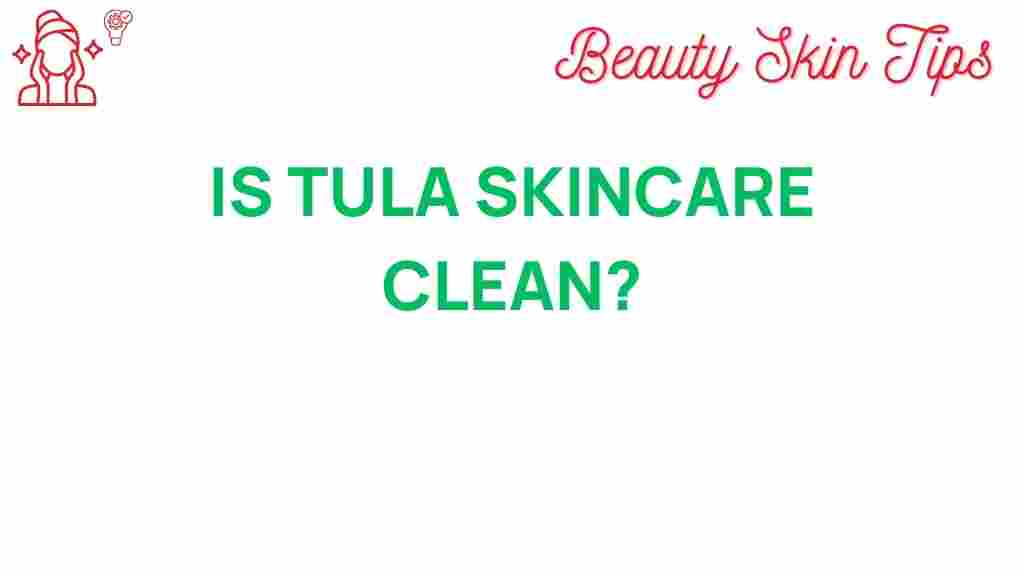Tula Skincare: Unveiling the Truth About Its Cleanliness
In the ever-evolving landscape of skincare, consumers are increasingly seeking products that prioritize both efficacy and safety. Among the myriad of brands available, Tula Skincare has emerged as a popular choice, renowned for its use of probiotic extracts and natural ingredients. However, as the clean beauty movement gains traction, many potential users are left wondering: is Tula Skincare truly clean? In this article, we will delve into the components of Tula Skincare, explore its ingredient philosophy, and assess whether it lives up to the clean beauty standards.
Understanding Clean Beauty
Before we dive into the specifics of Tula Skincare, it’s essential to understand what “clean beauty” actually means. Clean beauty generally refers to products that are made without harmful ingredients, focusing on transparency and sustainability. Here are some common characteristics of clean beauty products:
- No parabens, sulfates, or phthalates
- Natural, organic, or plant-based ingredients
- Non-toxic formulations
- Ethically sourced and cruelty-free
As consumers become more educated about their skincare choices, brands must adapt to meet these expectations. Let’s see how Tula Skincare aligns with these clean beauty principles.
What is Tula Skincare?
Tula Skincare is a brand founded on the principles of using probiotic technology and superfoods to improve skin health. The name “Tula” is derived from the Sanskrit word for “balance,” which reflects the brand’s mission to create balanced and healthy skin. The product line includes a variety of items, from cleansers and moisturizers to serums and masks.
The Ingredient Philosophy Behind Tula Skincare
One of the key components of Tula Skincare’s appeal is its ingredient philosophy. The brand emphasizes:
- Probiotics: These beneficial bacteria help to restore the skin’s natural balance and promote a healthy microbiome.
- Superfoods: Ingredients like blueberries, turmeric, and green tea are rich in antioxidants and nutrients beneficial for the skin.
- Transparency: Tula Skincare provides detailed ingredient lists and product descriptions, allowing consumers to make informed choices.
However, does this mean that Tula Skincare is entirely free from potentially harmful ingredients? Let’s take a closer look.
Examining the Ingredients
To determine if Tula Skincare is truly clean, it’s vital to examine the ingredients used in its products. Here are some key ingredients commonly found in Tula products:
- Water: The base for most skincare products.
- Probiotics: Such as Lactobacillus, which contribute to skin balance.
- Natural Oils: Such as coconut oil and sunflower seed oil, which provide hydration.
- Extracts: Like blueberry and turmeric for their antioxidant properties.
- Preservatives: Tula uses some synthetic preservatives, which are commonly debated in the clean beauty community.
While many of the ingredients are indeed natural and beneficial, Tula does incorporate some synthetic components. This raises the question: can a brand with synthetic ingredients still be considered clean?
Step-by-Step Analysis of Tula Skincare Products
To provide a well-rounded view of Tula Skincare, we’ll analyze some of its popular products, highlighting their ingredients and potential concerns:
Tula Purifying Face Cleanser
This cleanser is designed to remove impurities while maintaining the skin’s natural moisture. Key ingredients include:
- Probiotic extracts
- Natural oils
- Glycerin
The absence of harsh sulfates makes it a gentler option for daily cleansing.
Tula Hydrating Day and Night Cream
This moisturizer features:
- Probiotics
- Sunflower seed oil
- Shea butter
While the cream is hydrating, it does contain some preservatives that could concern certain consumers.
Tula Brightening Treatment Drops
This serum is designed to enhance skin radiance. It contains:
- Probiotics
- Vitamin C
- Natural extracts
The presence of Vitamin C is beneficial for brightening, but the formulation includes synthetic components as well.
Addressing Common Concerns
As we analyze Tula Skincare, several common concerns emerge among consumers:
1. Are All Ingredients Safe?
While Tula Skincare uses many beneficial ingredients, the inclusion of synthetic preservatives raises questions. Most of these preservatives are deemed safe by regulatory standards, but some consumers prefer to avoid them altogether. Always check the ingredient list and conduct a patch test if you’re concerned about sensitivities.
2. Is Tula Skincare Cruelty-Free?
Yes, Tula Skincare is committed to being cruelty-free. They do not test on animals, which aligns with the ethical standards of clean beauty. For more information, you can visit their official website here.
3. What About Sustainability?
Sustainability is a significant aspect of clean beauty. Tula Skincare has initiatives to reduce its environmental impact, including eco-friendly packaging. However, there is always room for improvement in this area.
Troubleshooting: What to Do If You Experience Issues
While Tula Skincare products are generally well-received, some users may experience issues such as irritation or breakouts. If this happens, consider the following troubleshooting tips:
- Patch Test: Always perform a patch test before using a new product to identify any potential reactions.
- Discontinue Use: If you experience irritation, stop using the product immediately.
- Consult a Professional: If issues persist, consult a dermatologist for advice tailored to your skin type.
Conclusion: Is Tula Skincare Truly Clean?
In conclusion, Tula Skincare presents a blend of probiotic technology and natural ingredients, appealing to consumers seeking effective skincare solutions. While the brand does incorporate some synthetic preservatives, its commitment to transparency, ethical sourcing, and cruelty-free practices cannot be overlooked.
Ultimately, whether Tula Skincare is deemed “clean” may vary based on individual definitions and preferences. For those who prioritize natural ingredients and want to support a brand that values skin health, Tula Skincare is an excellent choice. However, for consumers strictly adhering to a no-synthetic policy, it may not fully meet their criteria.
As always, it’s essential to research and choose products that align with your personal skincare philosophy. For further insights into clean beauty, you can explore this resource.
With the right information, you can make informed decisions about your skincare routine, ensuring that your choices contribute positively to your skin’s health and the environment.
This article is in the category Skincare and created by BeautySkinTips Team
